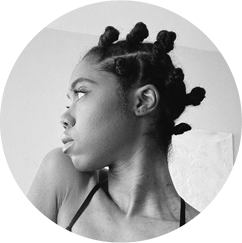Parenting doesn’t come with a manual.
When you entered this world, there was no welcoming committee for your parents. They weren’t handed a manual or a how-to guide on how to be quintessential parents. The truth is: most people are born into a reality by two individuals who are clueless about parenting.
Our parents inherited their ideas about parenting from the generation before them.
In the bold silence of generations past, people didn’t have the tools needed to have the necessary and healthy conversations needed to build a healthy foundation for their children. This lack of dialogue and communication was the conduit that allows generational curses, such as parentification, to flow from generation to another.
Parentification is when the parent-child role reverses–most times it manifests as a child that has to grow up too fast, as they take on responsibilities and roles such as being a caretaker, peacemaker, among other behaviors meant for adults.
In this dynamic the child takes on the emotional and functional responsibilities within their family system. In Black and Brown communities, being a parentified child is so normalized that children are often praised for the traits and qualities they develop from this traumatic and unhealthy parent-child dynamic.
So what does this look like? Here are three ways parentification can show up:
- Emotional Labor / Burden: You were often the peacemaker, voice of reason, or mediator during times of conflict between parental figures
- Being the ‘good’ one: You took on the role of caretaker for those in your family, catering to others’ physical and emotional wants and needs
- Being the ‘responsible’ one: You struggle to recall your childhood, because you grew up so quickly. You often took on responsibilities that are traditionally for adults, such as caretaking, etc.
Unfortunately, parent-child dynamics like this, have become the emotional bedrock from which we understand ourselves and how we show up in interpersonal relationships. The environments that we grew up in serve as the baseline for how we understand ourselves and the worlds around us. If you’re only exposed to certain dynamics, especially unhealthy or toxic ones, you naturally base your ideologies and beliefs around those limited experiences. In my case, taking on the burden and responsibility of family as a young child was, and is, normalized infor my family. I didn’t realize the effects of parentification and its impact on me until I started my self healing journey.
Not knowing how to deal with years of unchecked emotional baggage accumulated in childhood, led me to being a codependent, people pleaser with low self esteem, grappling with chronic depression and anxiety.
So how did I come to recognize my experience with adultification…
The conversations with my therapist, no matter the topic, often led me to reflecting on my upbringing. In several sessions, we sat in a dimly lit room — where the essence of a lavender candle lingered in the air and a low hum of the noise machine played in the background — as discomfort arose in the unsettled silence after she mentioned my childhood.
These reflections brought back memories and emotions that were subtle, yet powerful. I could feel my repressed emotions from a previous version of myself emerging. This silence was trying to tell me a story, as a range of intense emotions manifested themselves within my body. These painful feelings radiated and floated through me as they told me the story of a young girl who grew up way too fast. They told me the story of a young girl burdened by family.
At age 26, my feelings of anger, frustration and resentment finally made sense to me when my therapist said, “you were a parentified child”. As that singular phrase left her lips, a wave of emotion hit me, while a series of memories flooded my mind. For a couple moments, we sat in this thick silence, then I let out a sigh of relief, as the puddle of tears that had gathered in my eyes broke free. The droplets of warm salted tears streamed down my face as I started to feel a cocktail of emotions.
As a child, being the oldest in a first generation immigrant family, I was often the emotional dumping ground for my parents emotions. When the stress of life hit my parents, my involvement in household affairs increased. Their problems slowly became my problem! After all, children don’t really have problems, right? At least not in comparison to adults anyways, so I was told.
It was normal for me to be the shoulder to lean on or be the voice of reason when my parents struggled to communicate and resolve their problems. When money was tight and the stress was high, I was left to defuse the tension, by being placed in the center of the battle zone that was my parents’ relationship and problems. Conversations with my parents felt like meetings, as I walked away from each discussion with a short to-do list. Little did they know… in those moments, what I truly needed was for my parents to be my emotional support — without the strings of obligation attached.
In many ways I felt as though I was carrying my family on my back.
Was this acceptable? Was this normal? Was this even love?
This frustration festered, and it frequently led me to question why my parents even had kids.
After venturing out into the world, trying to create a life of my own, the pain of my childhood didn’t leave. As my zip codes changed, I created boundaries and some distance between my old world and my new one; but that didn’t stop the burdens of family and obligations from creeping in. At this point, I’d been so conditioned to focusing on being everything for everyone else — that I may have developed a minor savior complex, as a symptom of my trauma.
In adulthood, parentification manifests itself in our interpersonal relationships and our relationships with ourselves. This can look like:
- Being a people pleaser ( taking on the ‘fixer’ / caretaker / problem-solver persona)
- being in codependent relationships
- having issues setting boundaries and attracting toxic relationships that mirror dynamics from childhood.
- Feeling the need to prop everyone else up — even at the expense of your well being
- Silencing your own desires
Internally, parentification shows up as:
- perfectionist qualities
- a lack of emotional regulation skills
- mental health issues such as depression and/or anxiety.
The symptoms of parentification and how they show up in our lives are as unique as each of our traumas.
But no matter when, where, and how they show up, our job is simply to acknowledge the pain that comes and then ground ourselves in the power and autonomy that is adulthood. This is the time to nurture your inner child and be that adult that you needed as a child.
Spending so many years being a servant to others, led me to neglecting my emotions, personal growth, and healing. The bumps, bruises, and deep wounds from being a parentified child had already worn me down. I was ’13 going on 30’, long before I’d grown out my adolescent years. Many times I felt like my life wasn’t my own. I felt like a burden to my parents, as I though my existence in this world was the source for their stress. Reflecting back, I have to wonder if my eagerness to people please was a manifestation of a subconscious belief rooted in guilt.
When I was younger, I recall thinking of myself as a supporting character in everyone’s story. Was this my way of justifying the space that took up in the environments I occupied? I didn’t see myself as the main character because I felt that my existence was based on the desires and needs of others. This ideology, this belief, that my worthiness was dependent on transactional love impacted me immensely.
I’ve learned that being a parentified child presents itself in so many different forms all of which shapes and molds how we show up in the world. The truth is: our parents tried their best to be better parents than their parents were to them. It may be a hard pill to swallow when you look at the emotional bumps and bruises that came from your childhood, but it’s true.
That’s the thing, these experiences and emotions aren’t simple. (There are reasons why parents are who they are. Before they were parents that were people trying to figure it out, just like you and I.) There is a reason why our parents navigated the roads of parenthood in the way that they did. While feelings of resentment and anger may linger, know that it’s okay to hold space for those feelings. It takes time, space, and a multitude of conversations to grieve, release, and to make sense of the traumatic experiences connected to being a parentified child.
Through much self reflection and conversations with my therapist I’ve learned to lead with compassion for my parents, and most importantly, for myself. I’ve also learned that ‘good’ and ‘bad’ emotions can coexist in the same space!
Your self healing journey takes time, so I invite you to be gentle with yourself and let the emotions wash over you as you gain awareness — they are speaking to you so, you should listen. Addressing your trauma won’t be easy.
I’m here to say that some days I revert backwards, falling back into negative emotions upset as I recall certain experiences, and that’s okay. On this journey of unpacking, you’ll have to learn how to sit with your emotions to better understand them. You eventually learn to hold space for the different versions of you and your parents meanwhile, leaving with love and compassion.
It take courage to release past pains.
It takes courage to fight for the happiness and joy of the here and now.
It takes courage to let go of what ‘should’ have been.
Self exploration and awareness are two fundamentals that help to create the small shifts within ourselves. Through these shifts (in thinking patterns, beliefs, habits) may seem momentarily insignificant, these realizations are guiding you back home to your soul. Those intimate moments — that you share with yourself, a friend, or your therapist — will one day create a wave(s) in the ocean that is your lineage .
Change doesn’t happen all at once.
Change and healing is subtle and simple.
And it’s okay if you struggled to accept.
On that afternoon, when my therapist calmly uttered the phrase “you were a parentified child” something within me changed. That day I walked out of that session with a shift in my perspective. My trauma started to make a little bit more sense from that day on. I no longer felt as alone in my experience with this new found awareness. Discovering this new terminology, felt like I had unveiled a new language, a new world, that would better equip me on my journey called life.
Healing isn’t easy, it’s a lot of work, but i’m here to remind you that you may be the person that your bloodline has been waiting for. You may not view yourself as a visionary but on this self healing journey, you are pioneering a new view of life and love for generations to come.
Continue to push through.
Continue to explore.
Continue to be gentle with all parts of you.
Continue to shift so, that one day you may be able to bless your future children with a different type of inheritance. Sending you love and light on your journey.

About the Author: Fellisia Robinson is a first generation immigrant hailing from the island of Jamaica. You can find her passionately, sharing her raw and unfiltered stories & discussing anything related to healing & generational trauma.




JOIN THE DISCUSSION (0 comments)